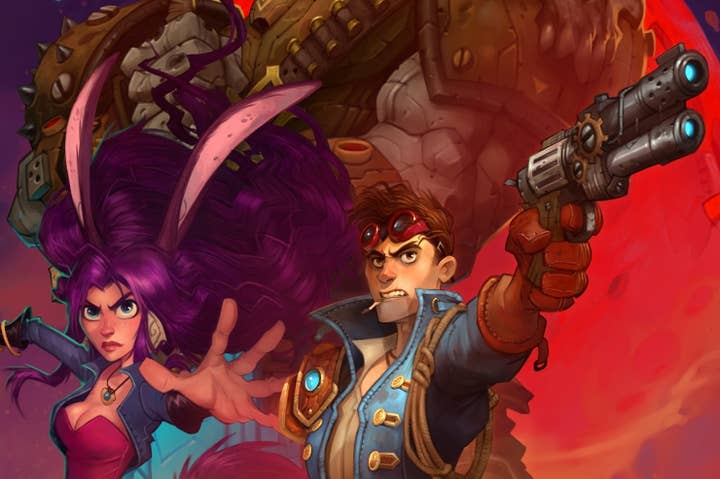NCsoft unveils Wildstar's "play to pay" business model
Jeremy Gaffney describes the new MMO's solution to the "polarising" problem of free-to-play
Attempting to be all things to all people is generally regarded as bad strategy, but not when it comes to monetising an MMO. Monthly subscriptions have proved too high a hurdle for most players, while micro-transaction based models are the subject of a sustained backlash from those tired of compromised gameplay and mercenary, money-grabbing tactics. MMOs require huge audiences and a constant stream of revenue to justify their existence, but, when it comes to the business model, what works for one developer won't necessarily work for their players.
"Business models are a very polarising thing," NCsoft's Jeremy Gaffney told Gamesindustry International. "Some people love this model or hate that model, but if you look on forums you'll see that people hate models a lot more than they love 'em. They've been burned before. They know the downside way more than they know the upside."
"Some people love this model or hate that model, but if you look on forums you'll see that people hate models a lot more than they love 'em"
According to Gaffney, that's as true for subscriptions as it is for the more obviously controversial free-to-play model, and any new MMO with commercial ambitions must recognise the strengths and weaknesses of both. NCsoft's Wildstar is an attempt to do just that: rather than run screaming from subscriptions and straight into the highly contentious world of micro-transactions, Gaffney and his team have engineered a system that embraces the most positive elements of both.
"There's two major options to play," he said. "One is super simple: buy a box, and pay a subscription. There's a class of player that likes that, because they know how much they're paying, they know the playing field is level, and they can expect big updates. That's the joy of the subscription model."
The other option isn't quite so simple, and while it can't be considered entirely unique - something to which Gaffney readily admits - in theory it will offer the opportunity to play Wildstar for free without undermining those that prefer to pay their way. As such, WIldstar's economy - both real and virtual - is geared around time: players either give real money in exchange for another week or month in the game, or raise enough virtual currency to trade for that extra time with other players.
The key to it all is C.R.E.D.D. - virtual tokens that can be exchanged for more time in the game. C.R.E.D.D. can be purchased through the Wildstar store for real money, or from other players through a virtual marketplace: the rather drily named "Commodities Exchange." On the Wildstar store, C.R.E.D.D. will have fixed price - broadly similar to the cost of subscription for the equivalent time period - but NCsoft will not impose value on the Commodities Exchange. That will be set by the players, and the familiar laws of supply and demand.
Ultimately, Wildstar's economy will rely on some people spending real money on C.R.E.D.D. to function at all, but those with a mind - and the time - to do so can play the game for free and never once be bothered by a micro-transaction. For those with a strong aversion to free-to-play it's an intriguing compromise, and one that places the onus on NCsoft to deliver a game that will reward such dedicated players. If earning enough virtual gold to secure another month in the game feels like a grind, the whole fragile construction could break and fall apart.
"The job we have to do right is to make sure that gold enters the economy properly," Gaffney said. "Not in an abusive fashion, not with exploits. The second thing is to make sure that there's fun ways for gold to be spent... We have a couple of ways that gold enters and leaves the economy that aren't normal with other games, so it's going to make C.R.E.D.D. feel quite different to systems in other games. But I freely admit that we have to do our job well on that. If not, then people will opt to pay for a subscription instead."
Or they may leave the game altogether. One of the major problems Wildstar will have to overcome is communication. Wildstar's business model may not require the several paragraphs of explanation it is given in this article, but it's not something that can be succinctly described on the back of a box, either. Like a good many other MMOs, Wildstar requires an up-front retail purchase to get any kind of access to the game - each copy is equivalent to a one-month subscription, and includes three week-long guest passes - and it's fair to ask just how many consumers will truly understand its "play to pay" system when the time comes to make a purchasing decision.
A monthly payment of £8.99 is a simple enough concept, but the same can't be said of C.R.E.D.D. and its attendant player-to-player economy. Wildstar is not a free-to-play game, but it's success is probably reliant on the ways in which it can be played for nothing. Gaffney is clear about the benefits of subscription revenue for both the developer and the player, but that alone is unlikely to be enough.
"The thing about this system is that it has big upsides for players and it has upsides for us - for that reason we love it. The challenge is that it's not as easy as saying that it's free-to-play or subscription or buy-to-play. It's a particular mix, and for that reason I don't think the mass audience necessarily embraces it. I think skilled players embrace it, who know similar systems from games they've played before and just need to learn our variant and how that works.
"But we're okay with that. We still think it's valuable to players. We think it's worth taking the time to explain it. The mantra has been that we're not marketing our game to naive players... We're speaking to gamers, and I think gamers will get it. If you don't want to pay a sub, we're putting in the extra effort to make sure you can do that."









